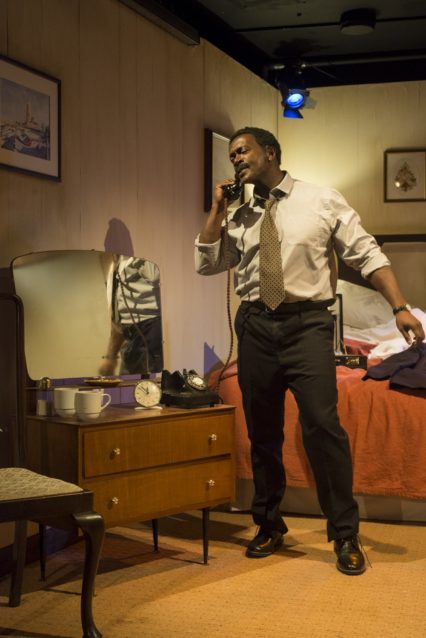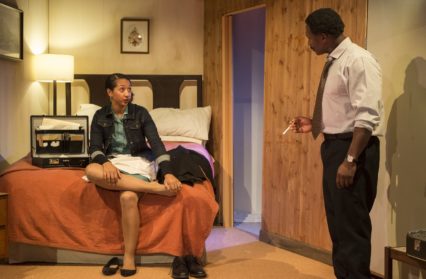Emily Garside casts a critical eye over The Mountaintop, produced by new Cardiff and London-based company FIO at The Other Room.
Memphis, Tennessee, and we are in the Louisiana Motel where civil rights leader The Reverend Martin Luther King Jr spent his last night before his assassination. King is alone after his speech to an audience of 2000, and coming off weeks of leading the Sanitation workers strikes of 1968. And, although the big questions do get pondered, Katori Hall’s play draws them out via the mundane details of human life. King is currently is worried about the fact that his feet smell, and he is frustrated to find he doesn’t have a toothbrush. The doubt he feels about his political purpose is matched in his indecision and outrage by the debate over whether he should shave off his trademark moustache.
 Mensah Bediako takes on the challenge of King admirably, and the focus on King the man, father, and husband, rather than King the Preacher and leader is drawn out from the writing. Although we see glimpses of the public persona, the emphasis on the version of King behind closed doors allows Bediako to make his own mark on the well-known figure. The array of emotion conveyed in his performance feels like an unlocking of someone we think we already know. In particular his paranoia, brought on by both the threat of violence and the threat of investigation by the government, and his now well-documented shortcomings as a husband. All of these Bediako balances with honest emotional expression.
Mensah Bediako takes on the challenge of King admirably, and the focus on King the man, father, and husband, rather than King the Preacher and leader is drawn out from the writing. Although we see glimpses of the public persona, the emphasis on the version of King behind closed doors allows Bediako to make his own mark on the well-known figure. The array of emotion conveyed in his performance feels like an unlocking of someone we think we already know. In particular his paranoia, brought on by both the threat of violence and the threat of investigation by the government, and his now well-documented shortcomings as a husband. All of these Bediako balances with honest emotional expression.
Alongside Bediako, sharing the stage for the entire 90-minute production, is Alexandria Riley as Camae, the maid sent to deliver coffee to King’s room. Pitch perfect in her delivery including a flawless Southern accent and delivery of the play’s African-American vernacular dialogue, she makes Camae a fascinating and likeable character. As the aduience’s way into King’s world it’s important they are on side, and Riley charms the audience as Camae charms King. With some brilliant comedic delivery and a rousing anger sitting comfortably side by side she delivers an engaging and at times electrifying performance. For both performers it’s a marathon of a performance with fast paced dialogue and intellectual and emotionally heavy material to deal with, but they rise to the challenge impressively.
There are some reservations with the material. The play, and the characters, are more interesting before the final act revelation that spins Camae’s character into something new, and has severe implications for King. And although the reasoning behind it can be understood, the real strength of the piece is in the earlier sections where we see the man behind the legend confronted by someone unafraid to challenge him. Knowing less about her is somehow more powerful than who she is revealed to be. Likewise, the power of the audience knowledge that this is King’s last night, is more powerful than letting the character on stage know, and some of the final moments are somehow less evocative once King the character is aware of his real life fate.
In the intimate setting of The Other Room, the final scenes do ultimately pack an emotional punch. Undoubtedly, having felt trapped in the motel room alongside Camae and Dr King for the last hour and a half, the rousing, emotional end to the play which looks back to history and forward to the future is emotionally and politically powerful.
Sometimes the fact that a play is on stage at all is the most important thing about it. Abdul Shayek, artistic director of Fio, who collaborated with The Other Room to bring The Mountaintop to Cardiff, says, ‘This is one of the very few times we have an all-black cast on a stage in Wales, which is absolutely mind-boggling.’ That The Other Room has chosen this work to open their Autumn season and as part of Black History month, also shows the theatre is continuing to push theatre in Cardiff to places it hasn’t’ been before.
The play originally struggled to find a theatre willing to stage it in America, perhaps put off by its at times no-holds-barred approach to revealing the man under the persona – it is unafraid to critique as well as praise his work in equal measure. Ultimately it found a home, and critical acclaim, in London, winning the then 28-year-old Hall an Olivier award. Taking King away from the stock images and quotable speeches Katori Hall’s play evokes the ordinary, everyday side of the man whose character has been obscured by myth.
The final moments talk of ‘passing the baton’ after King, are particularly poignant as we continue to hear of violence towards African Americans, and indeed as we look to problems of racism in our own country. And it should be applauded that in staging this play Fio and The Other Room are playing their part in passing on that baton. Theatre as ever can be a powerful tool in talking about the issues that Martin Luther King was urging people to listen to, but only if we give a stage to the voices that can tell these stories.
The Mountaintop is at The Other Room until Oct 15th.
(Image credits: Aenne Pallasca)












